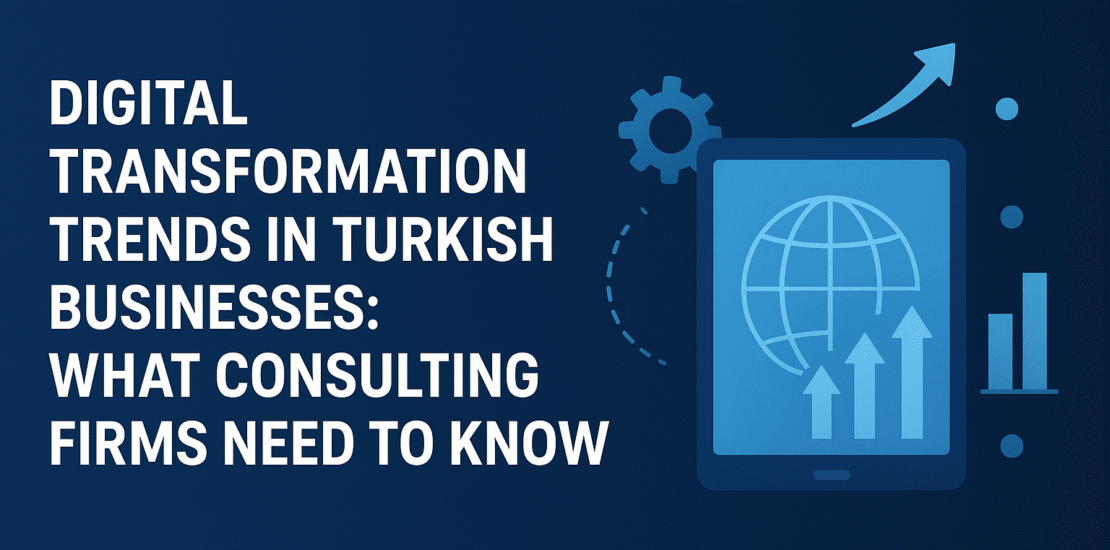- September 22, 2025
- Posted by: Admin
- Category: Business

The bustling bazaars of Istanbul, the ancient ruins of Ephesus – Turkey is a land rich in history and tradition. But beneath this vibrant cultural tapestry, a powerful modern current is surging: digital transformation. Turkish businesses, from agile startups to venerable enterprises, are rapidly adopting digital solutions to stay competitive, innovate, and connect with a global audience. For consulting firms, this presents a monumental opportunity. Understanding these evolving trends isn’t just an advantage; it’s a necessity for success.
The Digital Awakening: Why Turkish Businesses Are Going Digital
Turkey’s robust economy, youthful population, and increasing internet penetration are creating fertile ground for digital change. Companies are realizing that clinging to old ways means being left behind. The COVID-19 pandemic further accelerated this shift, forcing many businesses to pivot quickly to online operations, remote work, and e-commerce. This isn’t a passing fad; it’s a fundamental recalibration. Businesses are seeking efficiencies, better customer experiences, and new revenue streams that only digital strategies can provide. Consulting firms equipped to guide them through this journey will find themselves in high demand.
Key Digital Transformation Trends Shaping the Turkish Market
To effectively serve Turkish businesses, consulting firms need to be intimately familiar with the specific trends dominating the landscape.
1. E-commerce Dominance and Omnichannel Experiences
E-commerce in Turkey is booming. With platforms like Trendyol and Hepsiburada leading the charge, online shopping has become deeply ingrained in consumer behavior. Businesses are not just looking to have an online store; they’re striving for seamless omnichannel experiences. This means integrating online and offline touchpoints, offering personalized recommendations, and ensuring a smooth customer journey across all channels. Consulting firms can assist with e-commerce platform selection, payment gateway integration, logistics optimization, and data-driven personalization strategies.
2. Cloud Adoption: Scalability, Efficiency, and Security
Turkish businesses are increasingly migrating to the cloud to achieve greater scalability, reduce infrastructure costs, and enhance data security. This trend spans various cloud models – SaaS, PaaS, and IaaS – with a growing interest in hybrid cloud solutions that offer flexibility. Consulting firms can play a crucial role in cloud strategy development, migration planning, vendor selection (local and international cloud providers), and ensuring compliance with data privacy regulations. The move to the cloud isn’t just about technology; it’s about transforming operational models.
3. Data-Driven Decision Making and AI Integration
The era of gut-feeling decisions is fading. Turkish companies are recognizing the immense value of data in understanding customer behavior, optimizing operations, and predicting market trends. This includes implementing robust CRM systems, business intelligence (BI) tools, and exploring the potential of Artificial Intelligence (AI) and Machine Learning (ML) for advanced analytics, automation, and predictive modeling. Consulting firms with expertise in data analytics, AI implementation, and data governance will be invaluable partners, helping businesses transform raw data into actionable insights.
4. Cybersecurity: A Growing Priority
As digital adoption accelerates, so do cyber threats. Turkish businesses are becoming acutely aware of the importance of robust cybersecurity measures to protect sensitive data, maintain customer trust, and ensure business continuity. This trend necessitates comprehensive security audits, implementation of advanced threat detection systems, employee training, and adherence to international cybersecurity standards. Consulting firms can offer expertise in risk assessment, security architecture design, incident response planning, and compliance frameworks.
5. Digital Skills Gap and Talent Development
One of the biggest challenges accompanying digital transformation is the scarcity of skilled digital talent. Turkish businesses are struggling to find employees proficient in areas like data science, AI, cloud computing, and cybersecurity. This presents a unique opportunity for consulting firms to not only implement new technologies but also to help businesses build internal capabilities through training programs, talent acquisition strategies, and change management initiatives. Developing a digitally fluent workforce is critical for sustainable growth.
Navigating the Turkish Business Landscape: What Consulting Firms Need to Know
Beyond understanding the technological trends, successful consulting in Turkey requires cultural awareness and strategic positioning.
- Localization is Key: Generic global strategies often fall flat. Consulting firms must understand the nuances of the Turkish market, consumer preferences, and regulatory environment.
- Relationship Building: Business in Turkey is often built on strong personal relationships. Investing time in networking and building trust is paramount.
- Agility and Flexibility: The Turkish market is dynamic. Consulting firms need to be agile and adaptable, offering flexible solutions that can evolve with client needs.
- Focus on ROI: Turkish businesses, especially SMEs, are keen on seeing clear returns on their digital investments. Consultants must articulate the tangible benefits and provide measurable outcomes.
- Partnerships: Collaborating with local tech companies, incubators, and industry associations can open doors and provide invaluable insights.
Conclusion: Seizing the Digital Opportunity
The digital transformation sweeping across Turkish businesses is not merely a technological upgrade; it’s a strategic imperative. For consulting firms, this dynamic environment offers a significant opportunity to become trusted partners, guiding businesses through complex digital landscapes and helping them unlock new levels of growth and efficiency. By understanding the key trends, developing localized strategies, and building strong relationships, consulting firms can play a pivotal role in shaping Turkey’s digital future.
Are you a Turkish business ready to embrace your digital future, or a consulting firm looking to navigate this exciting market? Explore how Tokyo Consulting Firm is empowering businesses in Turkey to thrive in the digital age by visiting our services page: https://tokyoconsultingfirm.com/turkey/. Ready to take the next step? Register for a free consultation or trial today.
